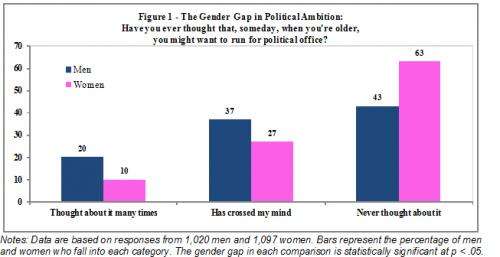Young women do not want to run for office

Despite some very high-profile female candidates and elected officials, and what looks like a changing landscape of U.S. politics, a new study conducted by American University professor and director of its Women and Politics Institute Jennifer L. Lawless and Richard L. Fox (Loyola Marymount University) reveals that young women are less likely than young men ever to have considered running for office, to express interest in a candidacy at some point in the future, or to consider elective office a desirable profession.
In their new report, Girls Just Wanna Not Run: The Gender Gap in Young Americans' Political Ambition, Lawless and Fox detail the results of a survey of a national sample of more than 2,100 college students. The authors find a dramatic gap between women and men's interest in running for office; men were twice as likely as women to have thought about running for office "many times," whereas women were 20 percentage points more likely than men never to have considered it (see Figure 1). Importantly, the 20 point gap is just as large as the one we previously uncovered among adult professionals (in their 40s and 50s) who were well-situated to pursue a candidacy.
The report identifies five factors that contribute to the gender gap in political ambition among college students:
- Young men are more likely than young women to be socialized by their parents to think about politics as a career path.
- From their school experiences to their peer associations to their media habits, young women tend to be exposed to less political information and discussion than do young men.
- Young men are more likely than young women to have played organized sports and care about winning.
- Young women are less likely than young men to receive encouragement to run for office – from anyone.
- Young women are less likely than young men to think they will be qualified to run for office, even in the not-so-near future.
Provided by American University















